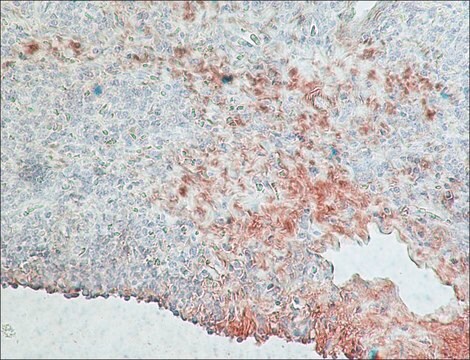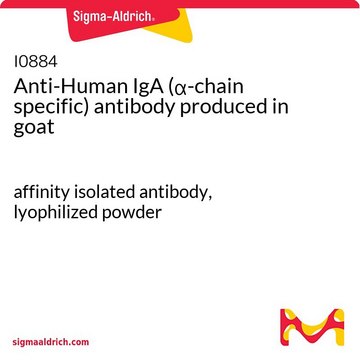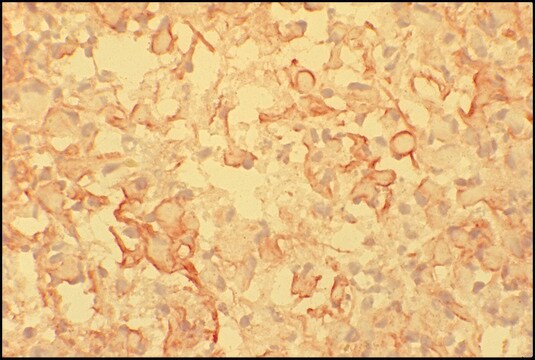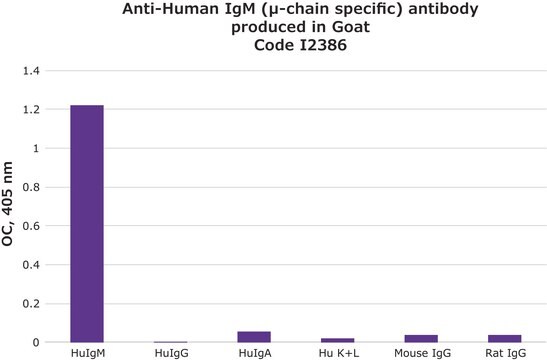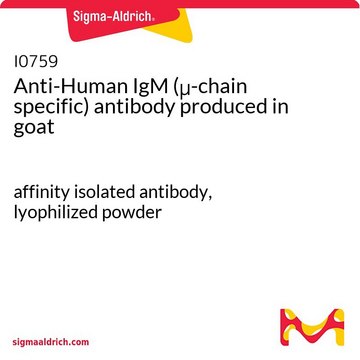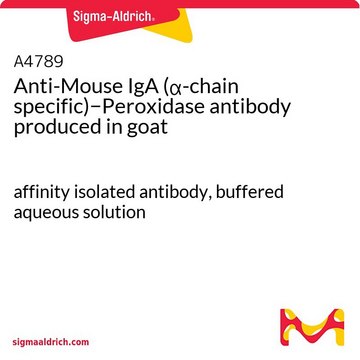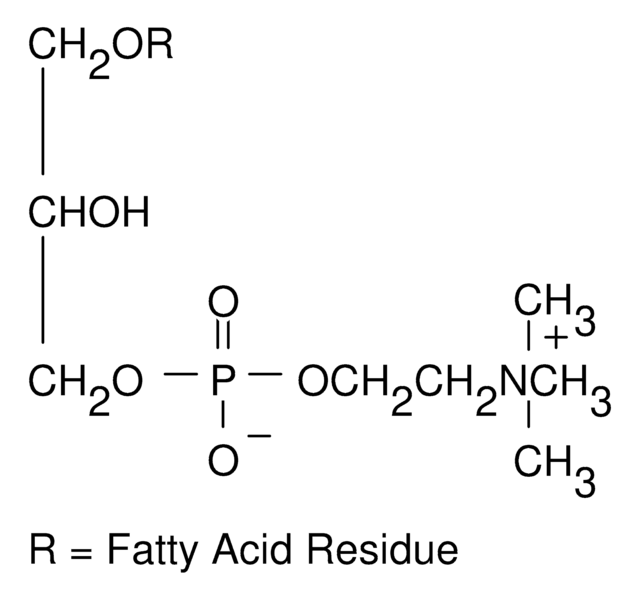A0412
Anti-Mouse Polyvalent Immunoglobulins (G,A,M)−Peroxidase antibody produced in goat
affinity isolated antibody
Sign Into View Organizational & Contract Pricing
All Photos(1)
About This Item
Recommended Products
biological source
goat
Quality Level
conjugate
peroxidase conjugate
antibody form
affinity isolated antibody
antibody product type
secondary antibodies
clone
polyclonal
species reactivity
mouse
technique(s)
direct ELISA: 1:10,000 using IgG, IgA, IgM
shipped in
dry ice
storage temp.
−20°C
target post-translational modification
unmodified
General description
Immunoglobulins are proteins produced by B cells in response to antigen and regulate response to bacteria, and viruses. IgG is known to regulate complement fixation and placental transport. IgA has a crucial role in mucosal immunity as it restricts pathogens from entering the mucosal membrane. IgM is the largest antibody having a pentameric structure which modulates polyreactivity and removes apoptotic cells,,. Goat anti-mouse polyvalent immunoglobulins (G,A,M)-peroxidase antibody binds to mouse IgG, IgA and IgM.
Application
The detection of antibodies in sera of T. gondii-infected mice was done by ELISA using peroxidase-conjugated anti-mouse polyvalent immunoglobulin antibody as the secondary. Relative binding affinities for specific Mabs were determined by an inhibition ELISA using peroxidase-conjugated goat anti-mouse polyvalent antibody diluted 1:10,000 in PBST and incubated for 1 hour at 21-23°C.
Physical form
Solution in 0.01 M phosphate buffered saline, pH 7.4 containing 1% bovine serum albumin with preservative.
Preparation Note
Prepared using the periodate method described by Wilson, M.B., and Nakane, P.K., in Immunofluorescence and Related Staining Techniques, Elsevier/North Holland Biomedical Press, Amsterdam, p215 (1978).
Disclaimer
Unless otherwise stated in our catalog or other company documentation accompanying the product(s), our products are intended for research use only and are not to be used for any other purpose, which includes but is not limited to, unauthorized commercial uses, in vitro diagnostic uses, ex vivo or in vivo therapeutic uses or any type of consumption or application to humans or animals.
Not finding the right product?
Try our Product Selector Tool.
Signal Word
Warning
Hazard Statements
Precautionary Statements
Hazard Classifications
Aquatic Chronic 3 - Skin Sens. 1
Storage Class Code
12 - Non Combustible Liquids
WGK
WGK 2
Flash Point(F)
Not applicable
Flash Point(C)
Not applicable
Choose from one of the most recent versions:
Already Own This Product?
Find documentation for the products that you have recently purchased in the Document Library.
Ianko D Iankov et al.
Vaccine, 29(8), 1710-1720 (2010-12-25)
Helicobacter pylori is a Gram-negative, spiral-shaped microorganism associated with acute and chronic gastritis, peptic ulcer, gastric cancer and gastric lymphomas in humans. H. pylori neutrophil-activating protein (NAP) is a major virulence factor playing a central role in pathogenesis of mucosal
Pari Skamnioti et al.
The Plant cell, 19(8), 2674-2689 (2007-08-21)
The rice blast fungus Magnaporthe grisea infects its host by forming a specialized infection structure, the appressorium, on the plant leaf. The enormous turgor pressure generated within the appressorium drives the emerging penetration peg forcefully through the plant cuticle. Hitherto
Nicole Forster et al.
Journal of immunology (Baltimore, Md. : 1950), 178(11), 6941-6948 (2007-05-22)
Conditional knock-in mice expressing a histone acetyltransferase-deficient version of the transcriptional coregulator p300 exclusively in B lymphocytes die prematurely with full penetrance. The mice develop an autoimmune disease similar to systemic lupus erythematosus in its pathological manifestations, such as splenomegaly
Hong Xin et al.
Infection and immunity, 74(7), 4310-4321 (2006-06-23)
We previously reported the enhanced resistance of monoclonal antibodies B6.1 (an immunoglobulin M [IgM]) and C3.1 (an IgG3) against experimental candidiasis. Both MAbs recognize the same fungal epitope. We have since found that a highly passaged B6.1 hybridoma (hp-B6.1) resulted
M Arvola et al.
Biology of reproduction, 63(6), 1817-1824 (2000-11-25)
It is well known that the transfer of immunoglobulins (Igs) from mother to young via milk contributes to the offspring's immune defense. The present study suggests that not only is IgG transmitted to progeny, but that functional maternal Ig-secreting cells
Our team of scientists has experience in all areas of research including Life Science, Material Science, Chemical Synthesis, Chromatography, Analytical and many others.
Contact Technical Service
